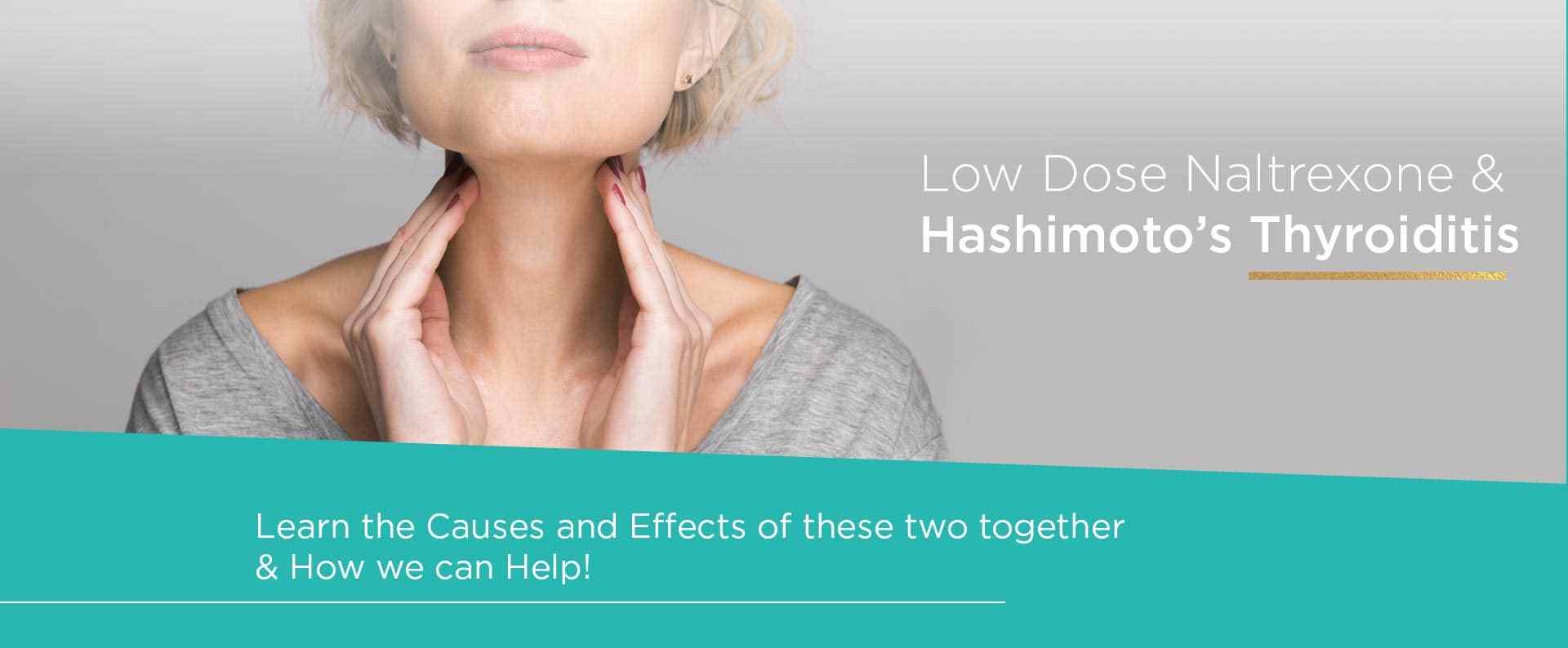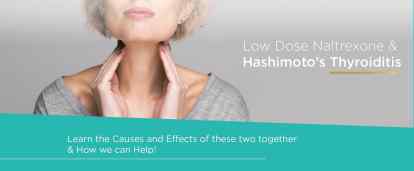The Interplay between Low Dose Naltrexone and Hashimoto’s Thyroiditis

Exploring the evidence and clinical relevance of LDN in autoimmune thyroid disease
Hashimoto’s thyroiditis is the most common cause of hypothyroidism in the developed world. As an autoimmune condition, it is driven by chronic inflammation, progressive thyroid tissue destruction, and elevated anti-thyroid antibodies — primarily anti-thyroid peroxidase (TPOAb) and anti-thyroglobulin (TgAb).
While thyroid hormone replacement (typically levothyroxine) remains the standard treatment, many patients continue to experience symptoms like fatigue, weight gain, brain fog, and mood changes — even when lab values appear “normal.” This discrepancy has led practitioners to explore adjunctive therapies that go beyond hormone replacement and target immune dysfunction.
One such emerging therapy is Low Dose Naltrexone (LDN).
LDN refers to the off-label use of naltrexone hydrochloride at doses between 0.5 mg and 4.5 mg daily, far below the standard 50 mg used to treat opioid or alcohol dependence.
At low doses, LDN doesn’t act primarily as an opioid blocker. Instead, it:
- Briefly blocks opioid receptors, triggering a rebound increase in the body’s endorphins and met-enkephalins
- Modulates immune function and inflammation
- Enhances tissue repair and neuro-immune signaling1,2
Hashimoto’s thyroiditis involves an overactive immune response that targets the thyroid gland. Hallmarks include:
- Th1-dominant immune activity
- Elevated inflammatory cytokines (e.g., IL-6, TNF-α)
- High levels of TPOAb and TgAb
LDN appears to shift the Th1/Th2 balance, dampen inflammatory signaling, and support regulatory T cell (Treg) function. These immunological effects position it as a compelling therapy for autoimmune diseases like Hashimoto’s.3,4
While large randomized controlled trials (RCTs) are still needed, emerging data and clinical reports suggest meaningful benefits of LDN for Hashimoto’s patients:
1. Symptom Relief
LDN may alleviate persistent symptoms including:
- Fatigue
- Brain fog
- Depression
- Chronic pain
- Mood swings5
2. Autoantibody Reduction
Case reports and observational data show LDN may lower TPOAb and TgAb titers by up to 30–50% over 3–6 months.
“We’ve seen patients whose antibody levels dropped significantly after starting LDN,”
3. Improved Thyroid Function
In some patients, LDN has correlated with lower TSH and stabilized T3/T4 levels — potentially reducing the need for higher hormone doses.7
Mechanisms that may explain LDN’s impact on Hashimoto’s include:
- Increased endorphin production – modulates immune responses and reduces inflammation
- Reduction of cytokines – including IL-6, TNF-α
- Treg/Th17 balance correction – restoring immune tolerance
- Improved gut-immune axis – may reduce leaky gut and immune triggers
- HPA axis support – by improving mood and sleep
LDN is typically started at 0.5–1.5 mg at bedtime, titrated to 3.0–4.5 mg as tolerated. Some patients may benefit from microdoses as low as 0.1–0.25 mg.
- Preferred timing: Bedtime dosing supports endorphin rhythm
- Forms available: Capsules, sublingual, or liquid (compounded)
- Alternate dosing: Split doses (e.g., 2 mg twice daily) can be used in some cases
LDN is widely regarded as safe and well tolerated.
Common side effects:
- Vivid dreams
- Insomnia (usually transient)
- Mild nausea or headaches
- Temporary symptom flares (Herxheimer-type reactions)
Contraindications:
- Opioid use – LDN will block opioid medications
- Liver dysfunction – use with caution
- Pregnancy – limited data available
LDN is not immunosuppressive and can be safely used alongside thyroid hormone therapy, including levothyroxine and NDT (natural desiccated thyroid).
LDN works best when integrated into a holistic, functional approach:
- Nutrient support: selenium, vitamin D, zinc, iron
- Gut healing: addressing dysbiosis and permeability
- Dietary triggers: gluten/dairy elimination (case-dependent)
- Stress support: adaptogens, lifestyle, and HPA axis regulation
It’s often added after stabilizing thyroid hormone levels and while addressing the root causes of immune dysregulation.
Summary: LDN for Hashimoto’s at a Glance
|
Benefit |
Clinical Impact |
|---|---|
|
Symptom relief |
Fatigue, brain fog, mood, pain |
|
Immune modulation |
Reduced Th1/Th17 dominance |
|
Antibody reduction |
Lower TPOAb/TgAb in many cases |
|
Tolerability |
Generally well tolerated, few side effects |
|
Mechanism |
Endorphin upregulation, cytokine modulation |
|
Form |
Capsule, liquid, sublingual – compounded |
Low Dose Naltrexone is not a miracle cure — but it is a powerful adjunct for patients struggling with Hashimoto’s symptoms despite “normal” labs. It offers a low-risk, well-tolerated option for rebalancing the immune system and addressing underlying inflammation.
As more clinicians integrate LDN into their protocols, it’s becoming clear: treating autoimmune thyroid disease isn’t just about hormones — it’s about healing the immune system.
If you’re a practitioner and want to learn more about integrating Low Dose Naltrexone into your practice, schedule a FREE training session with one of Harbor Compounding Pharmacy’s Clinical pharmacists now.
TO FIND OUT MORE ABOUT LOW DOSE NALTREXONE, CHECK OUT OUR BLOGS:
Discovery of Low Dose Naltrexone
An Introduction to Low Dose Naltrexone
Behavior Medication for Autism Spectrum Disorder (ASD)
Low Dose Naltrexone: The Chronic Pain Management Option 90% Doctors Don’t know About
Multiple Sclerosis: The Signs, Risks, and a Look at Low-Dose Naltrexone Treatment
What all Irritable Bowel Sufferers Need to Know about Low Dose Naltrexone



